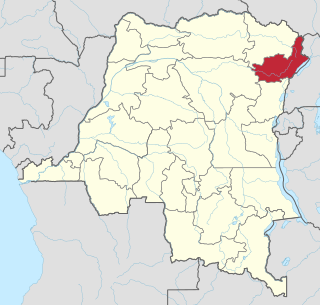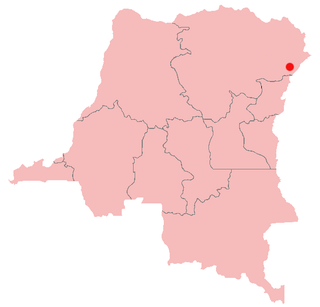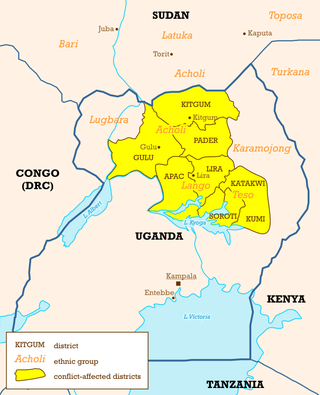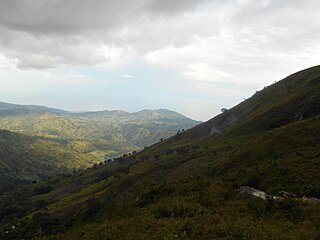The earliest known human settlements in what is now the Democratic Republic of the Congo have been dated back to the Middle Stone Age, approximately 90,000 years ago. The first real states, such as the Kongo, the Lunda, the Luba and Kuba, appeared south of the equatorial forest on the savannah from the 14th century onwards.

Ituri Province is one of the 21 provinces of the Democratic Republic of the Congo created in the 2015 repartitioning. Ituri, Bas-Uele, Haut-Uele, and Tshopo provinces are the result of the subdividing of the former Orientale province. Ituri was formed from the Ituri district whose town of Bunia was elevated to capital city of the new province.

The Hema people or Bahema (plural) are a Bantu ethnic group who are concentrated in parts of Ituri Province in the eastern Democratic Republic of the Congo.

The Ituri conflict is an ongoing low intensity asymmetrical conflict between the agriculturalist Lendu and pastoralist Hema ethnic groups in the Ituri region of the north-eastern Democratic Republic of the Congo (DRC). While the two groups had fought since as early as 1972, the name "Ituri conflict" refers to the period of intense violence between 1999 and 2003. Armed conflict continues to the present day.

Operation Artemis, formally European Union Force Democratic Republic of the Congo (EUFOR), was a short-term European Union-led UN-authorised military mission to the Democratic Republic of the Congo in 2003, during the Ituri conflict. ARTEMIS is considered the first military operation led by the EU, the first autonomous EU operation, the first rapid response mission of the EU, first operation outside Europe, first operation applying the principle of the framework nation and first example of "relay operation", conducted in cooperation between the EU and the United Nations. The deployment of EUFOR troops quickly decreased the conflict's intensity. It marked the first autonomous EU military mission outside Europe and an important milestone in development of the European Security and Defence Policy.

The Front for Patriotic Resistance in Ituri is a Bunia-based armed militia and political party primarily active in the south of the Ituri Province of northeastern Democratic Republic of the Congo.

The Kivu conflict is an umbrella term for a series of protracted armed conflicts in the North Kivu and South Kivu provinces in the eastern Democratic Republic of the Congo which have occurred since the end of the Second Congo War. Including neighboring Ituri province, there are more than 120 different armed groups active in the eastern Democratic Republic of Congo. Currently, some of the most active rebel groups include the Allied Democratic Forces, the Cooperative for the Development of the Congo, the March 23 Movement, and many local Mai Mai militias. In addition to rebel groups and the governmental FARDC troops, a number of national and international organizations have intervened militarily in the conflict, including the United Nations force known as MONUSCO, and an East African Community regional force.
The assault on Bogoro, which occurred on February 24, 2003, was an attack on the village of Bogoro in the Democratic Republic of the Congo (DRC) by the Nationalist and Integrationist Front (FNI) and the Front for Patriotic Resistance of Ituri (FRPI). The attackers allegedly went on an "indiscriminate killing spree", killing at least 200 civilians, imprisoning survivors in a room filled with corpses, and sexually enslaving women and girls. Two rebel leaders, Germain Katanga and Mathieu Ngudjolo Chui, have been charged by the International Criminal Court with war crimes and crimes against humanity over their alleged role in planning the attack.
The Dongo conflict was a minor conflict centered in the town of Dongo, on the left bank of the Ubangi River in Sud-Ubangi District, Democratic Republic of the Congo. Violence initially broke out in late October 2009 after a local dispute over fishing rights. This destabilised the region and led to a spiral of violence, and an exodus of civilians attempting to flee from the fighting. By December 2009, this conflict was one of the biggest conflicts of the United Nations Mission in the Democratic Republic of Congo (MONUC) and the United Nations; more than 168,000 people had fled their homes, many of them crossing into the neighbouring Republic of the Congo. An intervention by the Congolese army and MONUC brought the conflict to an end by 13 December 2009.

United Nations Security Council Resolution 1484, adopted unanimously on 30 May 2003, after recalling previous resolutions on the situation in the Democratic Republic of the Congo, the Council authorised Operation Artemis in Bunia, the capital of Ituri Province, amid the deteriorating security situation in the area.

The Peacekeepers is a 2005 documentary film directed by Paul Cowan, following the United Nations mission in the Democratic Republic of the Congo in the Democratic Republic of Congo between 2002 and 2004. The film portrays the attempts of UN Peacekeepers to avert a crisis similar to Rwanda in 1994. The film mixes footage from the actual conflict with that of UN officials behind the lines, to give a comprehensive portrayal of the conflict.

Uganda is one of the largest refugee-hosting nations in the world, with 1,529,904 refugees. The vast influx of refugees is due to several factors in Uganda's neighboring countries, especially war and violence in South Sudan and the Democratic Republic of the Congo, and associated economic crisis and political instability in the region. Uganda has relatively 'friendly' policies that provide rights to the refugees, such as rights to education, work, private property, healthcare and other basic social services.
The 2020 Democratic Republic of the Congo attacks were a series of attacks which took place in 2020. The attacks were mostly carried out by the Allied Democratic Forces (ADF), a radical Islamist rebel group and the Cooperative for the Development of Congo (CODECO), an agricultural and religious group made up of ethnic Lendu people. The attacks left at least 1,316 people dead and 132 injured.

CODECO is a loose association of various Lendu militia groups operating within the Democratic Republic of the Congo (DRC). The name is an abbreviation of the group's lesser-known full name, the Cooperative for Development of the Congo, sometimes also styled the Congo Economic Development Cooperative.
Attacks were carried out by various armed groups in the Democratic Republic of the Congo in 2021 and 2022. The attacks have killed 629 and injured 321. At least 82 perpetrators were also killed and one injured in these attacks.

Djugu territory is a district of Ituri, Democratic Republic of the Congo. Its capital is also named Djugu.
On 2 February 2022, over 60 civilians from the Hema ethnic group were killed in a massacre in Djugu territory, Ituri Province, Democratic Republic of the Congo.
On January 19, 2023, the United Nations investigators discovered the bodies of forty-two civilians in the village of Nyamamba, Ituri Province, Democratic Republic of the Congo, and seven bodies in the village of Mbogi, in the same province. The victims were killed over the weekend by suspected CODECO between January 14 and 15.
On the night between May 16 and 17, 2020, militants from the Lendu CODECO killed twenty-two civilians in the Hema village of Ndjala, in Ituri Province, Democratic Republic of the Congo.
The Ituri Self-Defense Popular Front, more commonly known as Zaïre-FPAC, is a decentralized Hema militant group or groups operating in the Democratic Republic of the Congo(DRC). They were formed in response to Cooperative for Development of the Congo (CODECO) expansions and the ongoing Ituri conflict. Fery little is known about the group, their organizational structure, or members. The group has committed several massacres and atrocities, and was "strongly condemned" by the United Nations in 2023 for their human rights abuses.











